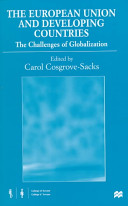
The European Union and developing countries : the challenges of globalization
By - Cosgrove-Sacks, Carol,
Floor
-
Floor 1
Published
-
St. Martin's Press, New York, 1999
ISBN 10 - 0312211899
ISBN 13 - 9780312211899
Book Status
-
1 Qnty Available with us.
Subject
-
Developing countries
, International economic relations
Shelf No
-
17
Call Number
-
337.401 COS